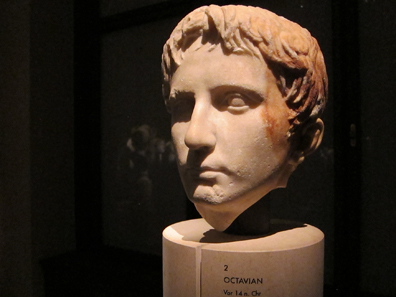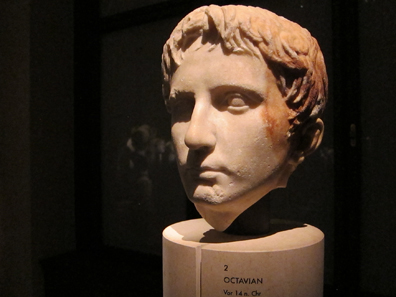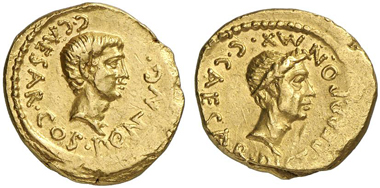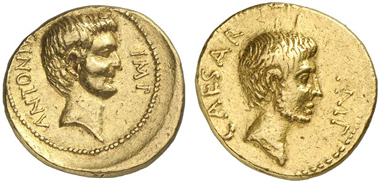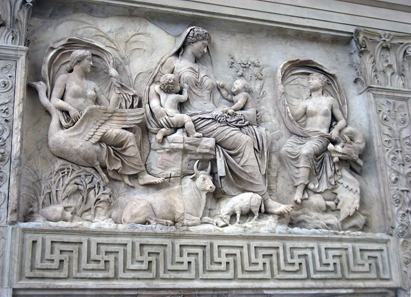The Son of Divine Caesar
Strictly speaking, he had no other choice, that young, awkward man that was sitting in Illyria on the Greek side of the Adria River, who had been waiting for his great-uncle to gain his first military merits in the war against the Parthians. When Gaius Octavius listened to what the express herald reported about the assassination of Caesar he was quite aware that in all probability he had to die soon, too. After all, he was the nearest male relative of the deceased dictator; and it was highly likely that Caesar’s assassins intended to eliminate him as well. There was only one option: to lead off the fight for the legacy of Gaius Julius Caesar.
Octavian. Portrait prior to 14 A. D. Altes Museum Berlin, inv. I110. Photograph: UK.
So Octavian officially came into the heritance of the dictator in front of the Roman assembly in early May 44. Hence forward he called himself Gaius Julius Caesar. He therewith thwarted Marc Antony’s plans who, being a skilled general, had established himself as political heir to Caesar and had absolutely no need for an adoptive candidate to that position. Soon they developed hostility towards another.
The conservative forces of the senate, Cicero in particular, hoped to exploit that for their own benefit. After all, this inconspicuous young man had an army on his disposal by then which he had recruited at his own expense. For that army Octavian needed something the senate could give him only: an official position, coming with a legal command.
What followed was a political somersault. In order to stand up against Marc Antony, Octavian made a pact with Cicero. He called him ‘father’, approved magnanimously that Casca, who had struck the first blow against Caesar, was elected as Plebeian tribune, and was granted a pro-praetorian command over his own soldiers in turn. Filled with belief in its own powers, the senate decided to finally take action against Marc Antony.
First thing was to relieve the city of Mutina (present-day Modena). Decimus Brutus stayed there against superior numbers led by Marc Antony. The battle for the city took place in April. It was gory. The troops of Octavian were nearly defeated. The army trapped in Modena intervened at the crucial moment. Octavian was incredibly lucky. He not only managed to defeat Marc Antony but, as bonus for him, the two consuls died in battle as well so that he, in his position as pro-praetor, all of a sudden became most senior commander of the entire army of the senate. The noble men in Rome didn’t fully realize what that meant. Cicero let himself be praised as savior of the Republic and put about the funny bon mot saying “We must praise the boy, give him a command and then raise him”, but the latter word, tollere, also stood for the contrary, i.e. eliminate. A fatal mistake because Octavian put forward hard-lined claims.
He wanted a triumph. And, of course, the consulship. The senators couldn’t believe it: what a shame! A 19 year-old intended to run for the highest office of the Roman Republic! While Rome gossiped viciously about that, Marc Antony had already joined his forces with the ones of Lepidus in furthest south-east of modern France.
Something had to be done about that, and Octavian in fact did something: he went to Rome with his army, seized the treasury and got himself elected as consul on August 19, 43, being not even 20 years old. After that, he led his army north. Cicero, his political foster-father, might have anticipated that he didn’t do that to fight Marc Antony.
312: Roman Republic. Octavian. Aureus, 43 B. C., mint in Gallia Cisalpina. Head of Octavian r. Rev. Head of Julius Caesar. Cr. 490/2. Bought in September 1956 at Ludwig Grabow, Berlin. Good very fine. Estimate: 25,000 Euros. Prize realized: 172,500 Euros.
In the months after the election as consul an aureus had been produced that was offered for sale in auction 203 of Gorny & Mosch, Giessener Münzhandlung, on March 5, 2012, under no. 312. The obverse shows the youthful portrait of Octavian. The inscription reads C(aius) CAESAR CO(n)S(ul) PONT(ifex) AVG(ustus).
The latter parts of the name refer to Octavian being member in the college of pontifices since 47 B. C. The reverse depicts his adoptive father wearing a wreath. Here we read C(aius) CAESAR DICT(ator) PERP(etuus) PONT(ifex) MAX(imus).
The estimate of that historically highly important piece was 25,000 Euros. The bids, however, didn’t stop there. An enthusiastic collector was willing to pay 172,500 Euros for this coin.
Politically, however, this coinage was outdated already a few months later. Octavian had a new title to be proud of: triumvir to restore the state. At the end of October, Marc Antony, Lepidus and Octavian had gathered in Bononia (modern Bologna) to come to an agreement. Together they would assume power in the Roman Empire and adjust the situation in their own interests. Octavian had won the acceptance of the two military men who were many years his senior even though he had been forced to make small concessions. But did he really bother that he had to sacrifice defiant Cicero?
311: Roman Republic. Octavian and Marc Antony. Aureus, autumn of 40 B. C., mint accompanying Octavian (central or southern Italy). Head of Marc Antony r. Rev. Head of Octavian r. Cr. 529/1. Ex Hess-Leu 2 (1959), 321. Good very fine. Estimate: 25,000 Euros. Prize realized: 50,600 Euros.
Testimonies to this new friendship are numerous coins showing the three triumvirs in a lot of variants. In auction 203 of Gorny & Mosch, under no. 311, another, very early example for such an emission was auctioned off. It had been minted in autumn 40 B. C. The Battle of Philippi and the defeat of the assassinators of Caesar had already been history at that time, Marc Antony had encountered Cleopatra and the Perusine War between Octavian and the younger brother of Marc Antony had called for new negotiations. The triumvirs again agreed on a joint approach in the Treaty of Brundisium of autumn 40. And they made that explicit in the coin image. On one side we see Marc Antony, on the other Octavian. Both are shown with their name and the title IMP(erator).
Thus they had imagined the bright future: abundance and peace in Italy. In 13 B. C. the Senate commissioned an altar to peace in honour of Augustus, the Ara Pacis. Four years later it was dedicated and one of its reliefs show a visual realisation of the idyllic world Virgil sung about in his Eclogues. Source: Manfred Heyde / Wikipedia.
When this coin was produced, Virgil wrote his 4th Eclogue. He dreamt of a new, peaceful age to begin with the birth of a child. That era, however, was still a long way off. Another ten years or so had to pass and countless Romans had to die before Augustus prevailed as autocrat and turned from a mass murderer into the emperor of peace.
By the way, the auction review with further results you can find here.






